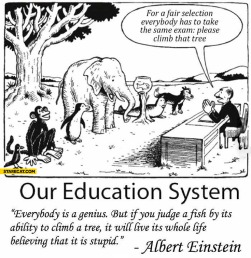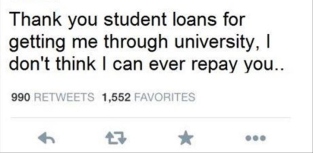As a year 11 student currently juggling exercise, sleep, social life, eating, relaxing and school, in moments of utter frustration I occasionally begin to wonder if going to school is really worth it. Of course, I immediately push the thought out of my mind because for me school has been the norm for three quarters of my relatively short life. Nevertheless, many famously successful people actually did not ever complete their schooling such as Albert Einstein, Benjamin Franklin, Thomas Edison and more recently Richard Branson and Elton John. So maybe school is not as important as it is said to be.
Firstly, primary school seems to be pretty indispensable as it is where children are taught the essential skills of literacy and socialisation. This is supported by the fact that the famous names above, who are school ‘drop-outs’, all left education at an age older than 11, when they had already assimilated these vital skills. Therefore, I would agree that a primary school education is definitely necessary. (In Europe and America at least as all of the famous names are from these countries)
So now children know the basic essentials of communication, is there need for further education? Probably, yes. Some primary schools only provide teaching for Maths, English and Art (to encourage creativity). Hence, secondary schools are important to offer a wider variety of subjects. At GCSE level you can narrow your subject area down to Maths, English, Sciences, a modern language and usually three or four others: humanities or arts. This doesn’t really seem like “narrowing”, you still cover all areas of education just in a less detailed way. This, to me, presents a lot of problems as we are always told that every student learns differently; for example, some are very creative but do not excel in the sciences or some are very good at sciences but cannot comprehend languages at all. I felt the photo below demonstrated this idea well:

Then again, GCSE’s help students to identify their strengths and weaknesses to prepare them to select only 4 or 5 subjects to continue at A level. (but do employers actually still look at GCSE grades? or do Universities look at them? Especially now when all students must continue education until they are 18 and gain a higher regarded/more precise set of results)
Some people think sixth form is unnecessary and just two years wasted learning things you will re-learn in greater depth at university. I have to disagree because I have been told (and believe) that sixth form helps to bridge the huge gap between school and degree level education by teaching independent learning and encouraging extracurricular interest in subjects. It is also a time to develop workplace and life skills through courses and work experience.
Now, after dealing with work, exams, social life, sleep, sport, gaining independence, searching for work experience and looking for opportunities; you continue to do so at university at probably a more intense level. But it is all worth it for the scroll, fancy hat and degree you are rewarded with at the end, isn’t it? Well, all of the famously successful people, who I listed to begin with, do not have degrees at all. Nonetheless, they were probably looking for jobs when having a CV bursting with A’s was not as vital as it is today.
Getting a university degree can cost hundreds of thousands of pounds, yet once you are let loose in a world of unemployment, there is no guarantee of success. A pretty risky investment. Even Abraham Lincoln, lawyer and U.S. president finished one year of formal schooling, self-taught himself trigonometry, and read Blackstone on his own to become a lawyer rather than being educated in the same way as everyone else. Perhaps the uniqueness to his tuition gave Lincoln an advantage in the world of work. Another example is Henry ford, a billionaire and founder of the Ford car company, who did not go to university at all. He seems to be doing pretty well. Even Simon Cowell dropped out of secondary school. Despite being greatly disliked by many people, he is still one of the highest earning people in the entertainment industry with roughly $95 million per annum.
All of these successful people who did not fully complete their education seem to highlight how unimportant school is. However, statistics show that more than 1.3 million students drop-out of secondary school every year; and that is just in America. So of these 1.3 million, it is most likely that barely any will be as successful in the future as these perhaps ‘education anomalies’ have been. In today’s world, I am told that employers are looking for very particular types of people to hire and they really do look at grades from school or college or university to determine who would be the most appropriate person for the job. This is, most probably, very different to how employment was a few decades ago, when a private education (or education at all) was slightly more of a rarity.
In addition, as I have briefly mentioned school puts a lot of pressure on people. Whether this is academic pressure, social pressure, financial pressure or athletic pressure, this pressure can be a serious deterrent from the schooling system. There are a shocking number of disorders which are believed to be a result of schooling. Some examples include anxiety, insomnia and eating disorders. More specifically, there is a less commonly known disorder called “medical students’ disease”- a condition frequently reported in medical students, who perceive themselves to be experiencing the symptoms of a disease that they are studying.
Moving on, with financial issues there are supposedly many government policies which attempt to make education more affordable. However, although bursaries and student loans seem helpful, they may actually not be as useful as initially thought. There is some dispute over people cheating their way into getting bursaries and then spending the money holidays or a new tv etc. Also, student loans seem to be more evil than helpful as evidenced by the hundreds of students complaining about them on social media:


Furthermore, to combat the problem of lost sleep, one school near me decided to change the start time of their school day. It is scientifically proven that teenage brains do not function properly before 10:00am and yet most schools begin lessons at 8:30am. Surely, this is counterproductive. Also, early starts often lead to sleep deprivation, which can have serious health and learning consequences such as weight gain, depression and reduced fertility. There are some informative BBC articles on this: http://www.bbc.co.uk/news/education-29461685
http://www.bbc.co.uk/news/science-environment-34192371
Also, here is an article on the school near me trialling the later start time of 10:00am.
[Moreover, England has some lengthy laws on education, which can be found here. But, to summarise it mainly says: in England since September 2010, all three and four year olds are entitled to 15 hours of free nursery education for 38 weeks of the year. All primary schools are legally required to provide a broad and balanced curriculum, and all maintained schools must teach the national curriculum for 5-16 year olds. However, university is post-compulsory education and, therefore, optional. Additionally, the rules on leaving school is you can leave school on the last Friday in June if you’ll be 16 by the end of the summer holidays. Then you must do one of the following until you’re 18:
- stay in full-time education, e.g. at a college
- start an apprenticeship or traineeship
- work or volunteer (for 20 hours or more a week) while in part-time education or training]
Furthermore, an alternative to modern conventional schooling is homeschooling, which does have quite a lot of benefits. The pros and cons of homeschooling are neatly displayed on this website: http://school.familyeducation.com/home-schooling/parenting/29861.html
To summarise, I found this video by a spoken word artist called Suli Breaks about his views on education. I cannot say I agree with absolutely everything he says but I think it is a creative way of communicating his opinions on exams and schools.